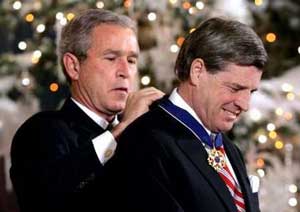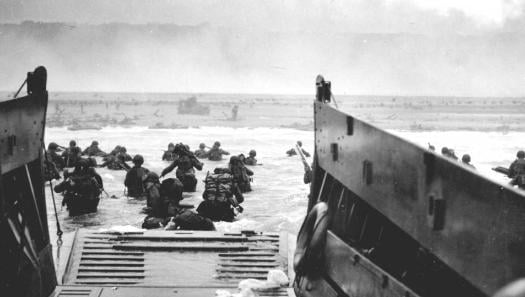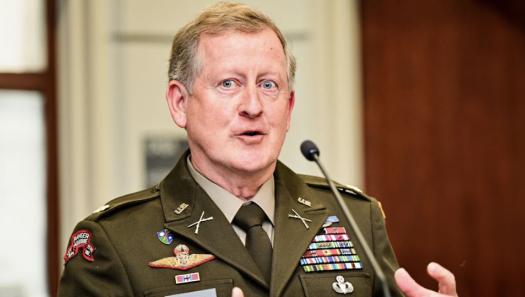Military & Veterans News
Vet News: Military Olympian Blog: Eli Bremer, Modern Pentathlon
Uncle Jerry By Eli Bremer

One of the most interesting parts of my Olympic story is not about me, but it is about my uncle. In media interviews everywhere around the world, it is common for me to spend most or all of my time discussing our relationship. Given that my uncle’s name and image are recognizable around the world, it is not surprising that people want to know about our interactions. In reality, my uncle’s story and my Olympic pursuit have been linked for years. His work has given me a much stronger understanding of the roll the Olympics play in world affairs and in bringing pride to a nation. For those of you who don’t know, my uncle "Jerry" is known publicly as Ambassador L. Paul Bremer III, the man who oversaw reconstruction of Iraq from 2003-2004.

The first time that Jerry became involved in my athletic career was back in 1995. As a senior in high school, I had been dabbling in pentathlon for a couple years. My season had gone well, and I had achieved the qualification standard to compete in the Junior World Championships. The only problem was money. My sport federation was not supporting junior programs so I needed to raise the money myself to fly to Taiwan and compete. Jerry found out and bought my ticket and a few pieces of equipment I needed.
Five years later, I was visiting Jerry over the 4th of July. One morning at breakfast, he asked if I had any big plans for the rest of the summer. At the time I was on a break between graduating the Air Force Academy and starting my Air Force active duty job. I mentioned that I wanted to go to watch the Olympics in Sydney, but I had to see if airline ticket prices dropped to an affordable level. Three weeks later, Jerry called me up with a surprise. "Eli, my wife and I have decided that money should not be an issue and you should go watch the Olympics. Call my secretary and have her book you a flight." Watching the Sydney Olympics was very inspirational, and I came home even more dedicated to my own Olympic pursuit.

Over the next couple years, I rose to the top of the US ranking list in pentathlon. I sent Jerry some shirts that said "Bremer, USA" on them, but I unknowingly sent him more than that. Jerry had seen me dedicate every facet of my life to qualifying for the Olympics and he saw how much impact the Olympics could have on people’s lives.
In 2003, I landed in Cairo mere hours after the US invaded Iraq. I had an opportunity to see first hand the rage in the streets, demonstrations, and massive anti-American sentiment. Interestingly enough, there was a tremendous amount of respect given to me and my teammate for daring to enter a predominantly Muslim country to peaceably represent our county in sports.
Within weeks of my return from Cairo, my dad called and told me to turn on the news. Jerry was being named to a new position. President Bush had appointed him the head of the Coalition Provisional Authority (CPA), the entity charged with civil reconstruction of Iraq. Within days, Jerry was on the ground in Iraq charged with the difficult task of undoing decades of societal decay in mere months.
During the summer of 2003, I continued my pursuit of the Olympics. I was one of only two US athletes to make the final at the 2003 World Championships in Italy. It was 115 degrees there and scorching. In Baghdad, 115 would have felt like winter in July. I was lucky enough to return home after my bout with the heat, while Jerry stayed in Iraq and wore a suit and tie every day in the sweltering heat to show an example of professionalism to the new Iraqi leaders.
Even before the air conditioning turned on (and that took a while) in the summer of 2003, Jerry took on an ambitious task. He decided the Iraqi people needed to see their team in the 2004 Olympics. Many people don’t know this, but Iraq’s Olympic Committee was decertified by the International Olympic Committee (IOC) following the US led invasion.
Prior to the invasion, Uday Hussein had run the Olympic Committee. Athletes were lavishly rewarded for good performances and tortured or executed for poor performance. The country’s Olympic infrastructure was, like the rest of the country, in shambles from years of corrupt and perverse operations.
The IOC decided that they would not allow Iraq to compete in the 2004 Olympics unless an entire new Iraqi Olympic Committee was created, starting with elections at the local level. Considering that Iraq had not held free elections of any kind in a generation, this seemed like an insurmountable task. But Jerry saw the value in giving this devastated country some much needed pride and worked to form the new Olympic Committee.
Months later, the first free elections in decades were held in Iraq, elections to create a new Iraqi Olympic Committee. After intense lobbying and work by my uncle, the IOC decided to allow Iraqi athletes to compete in the 2004 Olympics.
One day during the winter of 2003-2004, I received a call from Jerry in Baghdad. He asked if I was still doing most of my training at the Olympic Training Center (OTC) in Colorado Springs. He told me he was sending out a judo and wrestling team to train at the OTC and asked that I introduce myself and make them feel welcome. Weeks later, the small Iraqi team arrived at the OTC to prepare for the Olympics with the US Team. At the time, the US media was reporting that Iraqis were increasingly opposed to US led occupation and that anti-American sentiment was growing. I was unsure how the Iraqi team would view me, the nephew of the public face of US led occupation.
However, when the Iraqi team found out I was Jerry’s nephew, I was nearly dog-piled. I had grown men kissing me and nearly in tears. In a very emotional discourse of broken English, the Iraqis told me that Uday had tortured them and threatened them, but Jerry had given them hope and pride. During their stay, the Iraqis and I met several times. At one point, I arranged a conference call between the Iraqi team and my uncle in Baghdad. The Iraqis profusely thanked Jerry for his support and the opportunity to train in the US for the Olympics. In exchange, Jerry encouraged the Iraqis to be civil leaders when they returned home and to use their Olympic fame for the betterment of Iraqi society. Several weeks later, the Iraqi team returned home, ready to compete for pride of country rather than fear of torture and death.
When I failed to qualify for the 2004 Olympics, NBC hired me to work for them in Athens at the Olympics. At Opening Ceremonies, I was assigned to work with Andrea Joyce on the field. Andrea was going to conduct interviews with athletes after Opening Ceremonies, and my job was to find the athletes in the 10,000-strong gaggle on the field. During the Parade of Nations, we were able to sit back and watch the show. Three nations received standing ovations from the crowd in Athens: the Greeks, the US team, and the Iraqi team. I have rarely felt more pride than to see people from around the world acknowledge the significance of Iraq competing in the Olympics. An effort that my uncle had literally risked his life for was now the pride of the world.
During the Olympics, the Iraqi soccer team became one of the great stories. At a time when Iraqis factions rarely agreed with each other, the nation of Iraq could agree to support their Olympic soccer team. It was truly a unifying event for the people of Iraq and the nation.
At closing ceremonies, I encountered one of the heads of the Iraqi Olympic Committee. Not knowing how he felt about my uncle, I talked to him for several minutes before telling him who I was. When he saw my name on my credential badge, he responded like the Iraqi athletes had months earlier. He kissed me and told me that Jerry had likely saved his life and the lives of many other sportsmen.
Four years have passed since the 2004 Olympics. Today, Jerry has attempted to quietly step out of the spotlight and I have qualified for the Olympics. I recently had the chance to spend a day with Jerry in Washington DC, and we were able to talk about the Olympics, world affairs, and the normal family stuff. Jerry has always been an Olympic fan, but this year he has a much more personal reason to get involved and watch the Olympics.
I am extremely excited that Jerry, along with all the other friends and family who have helped me, will be able to see their efforts in my life come to fruition. As an Olympian, that may be the most significant part of going to the Olympics, the opportunity to thank your lifelong supporters with the act of representing your country in the Olympics.
I wish I could end this post on a high note, but as I was finishing writing this post, I saw some disturbing news headlines. Unfortunately, the success of the 2004 Iraqi team will not be revisited this year. The IOC has just announced that it is upholding a ban on the Iraqi team over internal problems with the Iraqi Olympic Committee. It is truly sad that the athletes and the people of Iraq will not have the inspiration or the common cause my uncle helped give them.
SOURCE: Eli Bremer Blog


